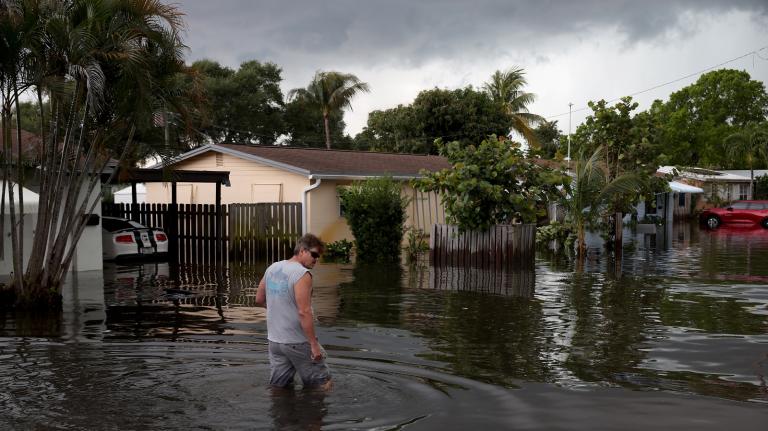 Rhetorical attacks on both sides of the tar-sands battle have gotten out of control.Photo: 350.orgCross-posted from the Council on Foreign Relations.
Rhetorical attacks on both sides of the tar-sands battle have gotten out of control.Photo: 350.orgCross-posted from the Council on Foreign Relations.
Opposition to the Keystone XL pipeline, which would move diluted bitumen from the Canadian oil sands to the Gulf Coast, has come into full force over the past couple weeks, with over 1,000 arrests at protests in D.C. I’ve written extensively regarding how both sides of the oil-sands debate exaggerate their arguments; in reality, the oil sands are neither a climate catastrophe nor an energy security bonanza.
As opposition has ramped up, though, pipeline opponents have gone into overdrive, introducing a host of new arguments, most of which are bogus. The purpose of this post is to sort out fact from fiction when it comes to the newer claims.
Let me be clear up front that my neglect of pro-pipeline arguments here doesn’t imply approval — many of them are ridiculous too. But I’ve written about them before, and don’t want to rehash old points. Nor should this post be read as saying that those who oppose Keystone XL are necessarily wrong on the fundamental question (though I tend to lean the other way): This fight is as much about power as anything else, and in politics, power matters.
On to the newer anti-Keystone claims:
“Gasoline made from the tar sands gives a Toyota Prius the same impact on climate as a Hummer using gasoline made from oil.” – Al Gore, Aug. 31, 2011
A Hummer gets 10 miles per gallon. A Prius gets 50. Gasoline from the oil sands entails roughly 15 percent greater emissions than gasoline made from the average barrel of conventional oil used in the United States. A Hummer using “gasoline made from oil” thus has 4.3 times the impact on climate as a Prius using “gasoline made from the tar sands,” not the same amount. None of these numbers are controversial (well, some in industry would claim that 15 percent is too high). Someone like Gore, who cares passionately about both climate change and scientific seriousness, should not mislead his followers on such a massive difference.
“Exploitation of tar sands would make it implausible to stabilize climate and avoid disastrous global climate impacts. The tar sands are estimated (e.g., see IPCC AR4 WG3 report) to contain at least 400 [gigatons of carbon] (equivalent to about 200 ppm CO2) … if the tar sands are thrown into the mix it is essentially game over.” – James Hansen, June 3, 2011
This claim, which has become the rallying cry of anti-Keystone protesters, is literally — and only literally — true. As Andrew Leach has noted, it would take until the year 3316 to extract all of that oil at a rate of 5 million barrels per day (itself several times the current pace of extraction). Whether or not the oil sands — a resource worth somewhere around $100 trillion at current oil prices — are fully exploited will not be determined primarily by whether a $7 billion pipeline is built. Their fate will be decided by demand for oil. Slash oil demand and oil-sands development goes away; keep oil demand on its current trajectory and we’ve got huge climate problems regardless of whether Keystone XL is approved.
“The Keystone XL’s tar-sands oil will be exported, because America doesn’t need it. Our nation is already a net exporter of finished petroleum products. That’s why a good deal of Keystone’s capacity will end up on the international market.” – Peter Lehner, NRDC, Aug. 31, 2011
Um, last I checked, the United States imported about half of its oil. So what gives? There are two separate arguments at work here, neither of which is convincing.
The first comes from Phil Verleger, an uber-sharp and contrarian guy. Phil argued earlier this year that current suppliers of oil to Gulf refiners, including Saudi Arabia and Venezuela, will insist on holding on to their U.S. market shares. That would force new Canadian oil supplies to be exported. I find this fairly implausible. For starters, Gulf refiners would do much better to sell their Saudi or Venezuelan oil on to other markets, and take Canadian oil instead, thus saving money on unnecessary shipping costs. (It is a lot more efficient, for example, to ship Saudi crude to China and Canadian oil to the United States than the other way around.) Phil suggests, though, that existing suppliers care so much about their U.S. markets shares that they will cut their prices in order to hold on. I don’t quite believe this, but Phil knows more about the finer workings of these markets than I do, so let’s take him at his word: The result would be cheaper oil for the United States. I don’t see what’s wrong with that.
The second argument is newer and more puzzling. Advocates have started noting that Gulf refiners are likely to export diesel made from Canadian crude. (Hence Peter Lehner’s observation that “our nation is already a net exporter of finished petroleum products.”) That sounds correct to me, but I don’t see why it matters. U.S. demand for refined products is tilted toward gasoline; European demand is biased toward diesel. As a result, the United States ships diesel to Europe, and buys gasoline from it. Canadian oil would increase the amount of U.S. gasoline that is produced in the United States, which is to say, it would decrease imports. The fact that some additional diesel would be exported to Europe doesn’t change that. In addition, if one thinks that sourcing oil in North America gives the United States an economic cushion against oil price volatility, that cushion remains regardless of whether the refined products are exported or not. Moreover, regardless of what happens to the refined products, more oil from Canada means less oil imports from elsewhere — that’s just basic arithmetic.
I should emphasize that, as I’ve written before, I don’t believe that the source of U.S. imports matters all that much. It may matter marginally because of how petrodollars flow, but even then, I’m not sure. But that’s the premise implicit in NRDC’s claim that the existence of diesel exports somehow matters; hence the need to set this part of the record straight.
“Canadian companies intend to incur higher pipeline tariff costs using the Keystone XL pipeline to bypass PADD II refineries in the Midwest. This will have the effect of manipulating supply levels, allowing prices of oil refined in PADD II to rise, and ultimately benefiting the Canadian companies with higher prices … It is therefore critical to determine whether the increased prices expected to be incurred by U.S. c
onsumers and the potential for significant redistribution of crude oil supplies now destined to U.S. refineries due to the proposed construction of this pipeline is the result of anti-competitive practices that violate U.S. laws through agreements among the proposed shippers.” – Sen. Ron Wyden (D-Ore.), April 6, 2011
This is the trickiest of the anti-Keystone arguments. Canadian oil currently faces a dearth of outlets due to inadequate pipeline infrastructure. The result has been a glut in Cushing, Okla., leading to anomalously low prices there. Keystone XL would rectify that, leading to similar prices for oil in all parts of North America. This is what pipeline opponents refer to as “manipulation.” It would be more accurate, though, to describe the current state of affairs as the one involving manipulation — it is not natural for oil to have such different prices in different parts of the United States — and the hypothetical one with Keystone XL as representing a freer market.
So why is this tricky? The current “manipulation” may actually be good for the United States, since cheaper oil for U.S. refiners from Canadian producers is economically beneficial. Ending that manipulation, on the other hand, could raise prices for many U.S. refiners. But this should be seen as a pure national interest calculation, not one where the United States is somehow on the side of the free market angels. Moreover, this is not the full picture. Retarding infrastructure development will eventually depress production in Canada (and possibly North Dakota), raising world oil prices. Midwest refiners might benefit, but all other U.S. oil consumers would suffer.
A final thought
I would be remiss if I didn’t conclude this post with an observation about how unpleasant the debate over Keystone XL has become. In Vancouver last week, I had dinner with a few people from Edmonton (no personal connections to the oil industry), who were absolutely baffled by the invective being hurled at Alberta from south of the border. I know: Politics is a rough-and-tumble business. But this has gotten absurd.
Both sides are guilty. Earlier this year, Alberta Energy Minister Ron Liepert offensively demanded that President Obama “sign the bloody order” approving Keystone XL. But the opponents have really taken things up a notch in recent weeks. NRDC tweeted earlier this week that Canada might be “practical evil”; the sentiments expressed by many protesters are pretty similar. Indeed, when you compare yourself to Martin Luther King and the civil rights movement, you’re placing those who disagree with you in pretty horrific company. It’s long past time for some perspective all around.




